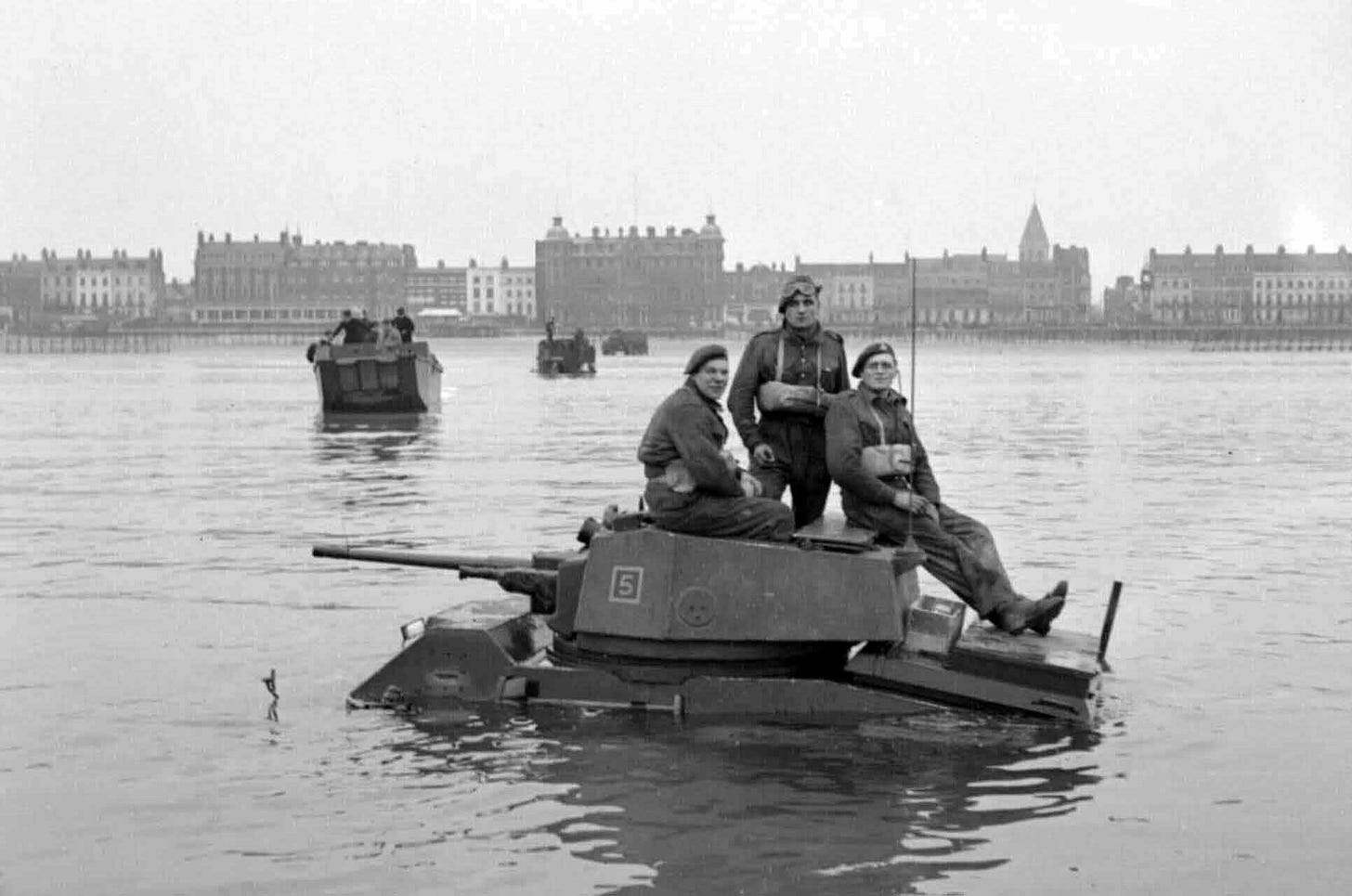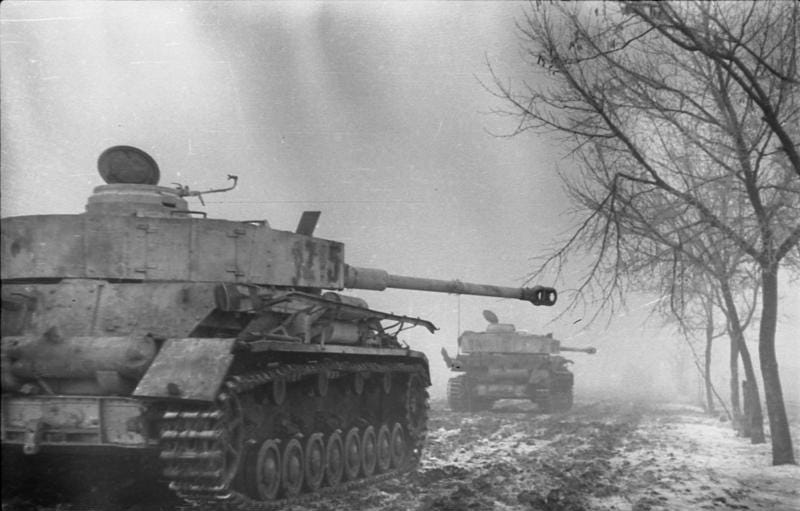A war barely interrupted by Christmas
25th December 1943: The wartime Christmas is remembered as being 'special' for different people around the world
All around the world the war continued, with few interruptions in the fighting. Nevertheless, wherever it was possible, there were many who did their best to mark the day with some form of celebration.
I celebrated a real Midnight Mass in a real Stable, with a real Manger for an Altar.
The Reverent E. N. Downing1 was with the 4th Parachute Brigade who, only a few days before, had gone forward to the trenches of the front line in Italy:
Christmas came a few days after we had moved up. Troops noticed with some wonder that the Germans celebrated ‘Heiligenacht’ by ringing the Church bells on their side of the valley. For myself I had felt at something of a loss, for we clearly could not assemble any large number of men for a Service when we were under fire.
My final decision, after consultation, was to have one Service, Holy Communion, at Battalion HQ, and then to go round with the Reserved Sacrament to every position. The only suitable time for the Service was midnight, and I celebrated a real Midnight Mass in a real Stable, with a real Manger for an Altar. The whole situation, with the Manger and the danger, stranger than I had ever known, made it the most real and poignant Christmas I ever experienced.


Incredibly, in the middle of the bloody struggle for Ortona, which continued to the 28th, Canadians from the Seaforth Highlanders2 were pulled out of the battle to enjoy a short respite from war:
The setting for the dinner was complete, long rows of tables with white tablecloths, and a bottle of beer per man, candies, cigarettes, nuts, oranges and apples and chocolate bars providing the extras. The C.O., Lt.-Col. S. W. Thomson, laid on that the Companies would eat in relays... as each company finished their dinner, they would go forward and relieve the next company...
The menu... soup, pork with apple sauce, cauliflower, mixed vegetables, mashed potatoes, gravy, Christmas pudding and mince pie... From 1100 hours to 1900 hours, when the last man of the battalion reluctantly left the table to return to the grim realities of the day, there was an atmosphere of cheer and good fellowship in the church. A true Christmas spirit. The impossible had happened.
No one had looked for a celebration this day. December 25th was to be another day of hardship, discomfort, fear and danger, another day of war. The expression on the faces of the dirty bearded men as they entered the building was a reward that those responsible are never likely to forget ... During the dinner the Signal Officer... played the church organ and with the aid of the improvised choir, organized by the padre, carols rang out throughout the church.

In North Africa Winston Churchill was still recovering from pneumonia, which had made him dangerously ill. His family had been summoned, and at one point, he had told his daughter that, if he died, he would do so knowing that the war would won by the Allies. Now he was bouncing back and in the early hours of Christmas Day was organising a new offensive in Italy. They would sidestep the German defensive line with a new amphibious landing closer to Rome.
Even if it seemed inevitable to many that the Allies would eventually win the war, it wasn't going to happen until many more had died in many different parts of the world.

This was the British Air Ministry's take on Christmas celebrations in northern Burma:
Christmas at the Arakan airfields was not the less gay because of the hazards of coming encounters. One Spitfire squadron staged a pantomime to which the others came. It was given in a jungle glade on Christmas night, with a clear sky. Between the audience and the airfield men could see in the dusk the paddy ripening into golden shades; behind them lay the forest, in which elephants were trumpeting.
The show was ‘Aladdin’ and the humour, of course was local, with Aladdin's mother a ‘dhobi-wallah' or washerwoman who made her profits by tearing off shirt buttons and selling them back to the owners. Two navigation lights, red and green, flickered as jewels in the djinn's turban, while Aladdin's cave was strewn carelessly with what then were the rarest things in India - Spitfire tyres. Great applause was that night given to the stars in the show, almost every one of whom was destined to be killed in the coming weeks.

For many others, there really wasn't any hint of any concession to Christmas.
Ted Johnson was an officer with the Royal Ulster Rifles3 who had been taken prisoner on the island of Leros during the ill-fated British Dodecanese campaign. Late on Christmas Day he finally arrived at a prison camp in Germany where he began a period of solitary confinement:
After the usual “Raus, raus, schnell, schnell” we marched through the snow towards the lights of a camp on the horizon. The welcome we got was no different from any other prison we had so far encountered: wire, grim-looking Wehrmacht soldiers and the predictable rough-looking German Shepherd dog with handler.
The inevitable body search took place again. This time all personal possessions were taken and with Teutonic efficiency were listed in detail. Toilet articles were given back and we were permitted to keep the clothes we wore. We were all issued with a palliasse cover, two wood pulp blankets, one bowl, one knife and one spoon. By now the outlook was worrying!
Next, we were moved into a long low building which contained individual cells. I now saw the truth behind the news about each officer having his own room! No explanation was given as to why or for how long one was being given such personal attention, but by now, since capture, we were becoming used to the devious methods of the “detaining power”. It dawned on me that I was in solitary confinement and that this was a novel way to celebrate Christmas.
There was no meal that evening but a redeeming feature was that my cell was warm. This personal hovel in which I spent the next 10 days measured 15ft x 7ft 6 inches (5 paces by 21⁄2 paces) and contained a bed with straw palliasse, a table and a stool. The metal door had the traditional peep hole, the small window was barred and high out of reach. Twice daily, what passed for food and drink was brought into my cell by a Russian slave labourer under armed escort. It was from one of these unfortunate walking skeletons that I learned why I was incarcerated – interrogation.
Meanwhile, on the Eastern Front, the fighting went on as usual. What that actually meant for 19th Panzer Division4 can only be guessed at:
... I shall never forget that extraordinary Christmas Day. A signal came through from 19 Panzer: ‘Am attacked by thirty enemy tanks. No petrol. Help, help, help’— then silence.
General Balck absolutely refused to send ‘Leibstandarte’ into action in dribs and drabs, even if this meant the total loss of 19 Panzer Division. Eventually, after nearly six hours of anxious waiting, a signaller handed me a most welcome message from 19 Panzer: ‘We are withdrawing to the west in tolerable order.’


This post is free … consider becoming a paid subscriber to get the daily posts … 20% off until the end of the year.
Seaforth Highlanders Regiment, War Diary, December 25th, 1943
http://www.deddington.org.uk/__data/assets/pdf_file/0018/9117/TheBattleforLeros-TedJohnsonandBillMinnear.pdf
Major General F.W.Von Mellenthin: Panzer Battles 1939-45.
N.B. Links to Amazon are affiliate links when accessed from the web (but not from the newsletter).



